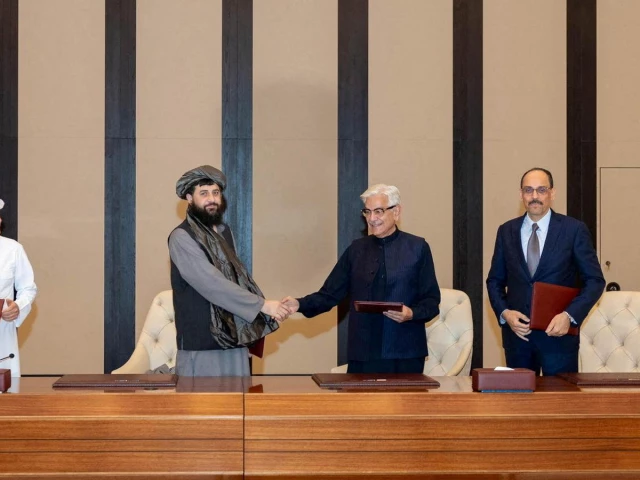The upcoming dialogue is a follow-up to previous talks that resulted in a provisional agreement at the last minute
Defense Minister Khawaja Muhammad Asif and Afghan Defense Minister Mullah Mohammad Yaqoob Mujahid shake hands after signing a ceasefire agreement brokered by Qatar and Turkey in Doha on October 19. Photo: Reuters
Pakistan and the Afghan Taliban regime are set to hold crucial talks in Istanbul amid heightened tensions following deadly border clashes and Pakistan’s growing frustration over continued cross-border attacks by the outlawed Tehreek-e-Taliban Pakistan.
The Pakistani delegation led by Director General of Inter-Services Intelligence (ISI) and National Security Adviser Lt Asim Malik reportedly left for Istanbul on Wednesday, according to sources. The meeting in Istanbul is a follow-up to previous talks that lasted five days and salvaged an interim agreement at the last minute.
The Afghan delegation led by intelligence chief Abdul Haq Wasiq also includes Deputy Interior Minister Haji Najib, Foreign Ministry spokesman Abdul Qahar Balkhi and senior Taliban leaders Sohail Shaheen and Anas Haqqani, who are already in Istanbul. The main-level meeting between the two sides, facilitated by Turkiye and Qatar, will focus on counter-terrorism cooperation, border management and a mechanism to prevent further escalations along the Pakistan-Afghanistan border.
Last month’s violent clashes along the borders left scores of casualties on both sides and prompted Pakistan to close key crossings. In recent weeks, Pakistani security forces have intensified operations against terrorists, many of whom Islamabad says continue to operate from Afghan soil. Pakistan maintains that the TTP leadership enjoys safe havens in Afghanistan and has repeatedly called on Kabul to take “decisive action” against the group.
Earlier this week, Inter-Services Public Relations (ISPR) Director General Lt. Gen. Ahmed Sharif warned in an informal briefing to reporters that any cross-border attack from Afghanistan would be considered a ceasefire violation and “responded to with full force.” “If Afghanistan’s soil is used for terrorism against Pakistan, the ceasefire will be invalid,” he said, adding that Pakistan had shown restraint despite repeated provocations but would no longer tolerate violations.
Read more: Pakistan warns that the Taliban ceasefire will not last if the attacks continue
According to military estimates, at least 206 Afghan Taliban fighters and 110 TTP militants have been killed in recent border clashes. Pakistani officials also claim that a significant number of militants involved in attacks in Pakistan were Afghan nationals.
Diplomatic sources said the Istanbul dialogue will focus on establishing a verifiable mechanism to prevent cross-border infiltration and share intelligence on militant movements. Pakistan will push for tangible action against the TTP and the dismantling of their training and logistical camps inside Afghanistan.
The Afghan side, meanwhile, is expected to express concern over Pakistan’s airstrikes inside Afghan territory and the repatriation of undocumented Afghan refugees. Kabul maintains it does not support cross-border attacks and has called on Islamabad to address “internal security lapses” instead of blaming Afghanistan.
The upcoming talks are being held under the joint facilitation of Turkiye and Qatar, both of which played a role in the recent Doha ceasefire understanding. Ankara and Doha are reportedly pushing for a long-term framework to prevent a complete breakdown in ties between Pakistan and Afghanistan, which could destabilize the wider region.
Officials familiar with the process say the Istanbul meeting could prove to be a “make-or-break” moment. Failure to reach an understanding on counter-terrorism measures could lead to further border militarization, closure of crossings and disruption of trade between the two countries.
This was reported by a senior Pakistani official Express Pakinomist that Islamabad wants “results, not rhetoric.” He added, “Pakistan’s position is simple…Afghan soil must not be used for attacks on Pakistan. If this commitment is not met, all options are on the table.”



